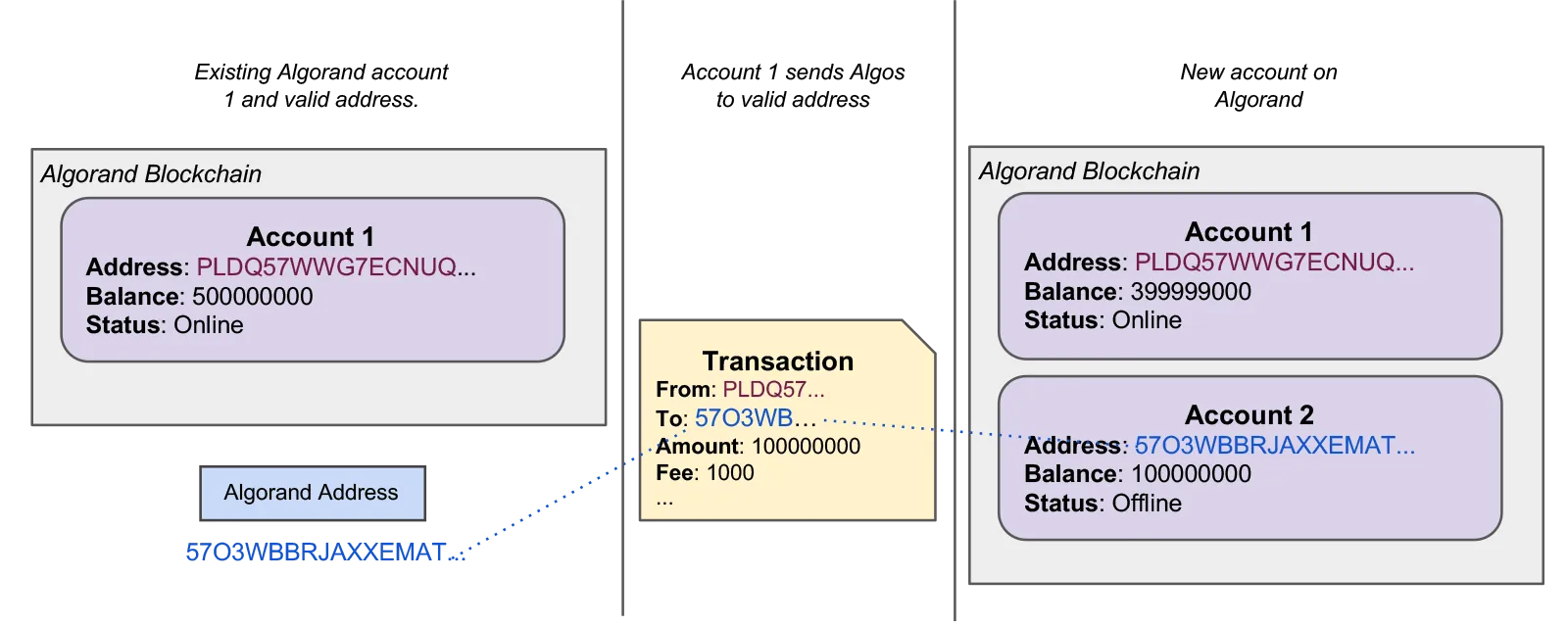Overview
An Algorand Account is a fundamental entity on the Algorand blockchain, representing an individual user or entity capable of holding assets, authorizing transactions, and participating in blockchain activities. Accounts on the Algorand blockchain serve several purposes, including managing balances of Algos (Algorand’s native cryptocurrency), interacting with smart contracts, and holding Algorand Standard Assets (ASAs).
Quick start videos
If you prefer videos, take a look at this 6 minute guide to Learn How to Manage Private / Public Algorand Account Keys.
An Algorand account is the foundation of user interaction on the Algorand blockchain. It starts with the creation of a cryptographic key pair:
- A private key, which must be kept secret as it is used to sign transactions and prove ownership of the account.
- A public key, which acts as the account’s unique identity on the blockchain and is shared publicly as its address.
The public key is transformed into a user-friendly Algorand address — a 58-character string you use for transactions and other blockchain interactions. For convenience, the private key can also be represented as a 25-word mnemonic, which serves as a human-readable backup for restoring account access. Refer to Keys and Signing to understand on how transformation happened from public key to algorand address.
Accounts
Accounts are entities on the Algorand blockchain associated with specific on-chain data, like a balance. An Algorand Address is the identifier for an Algorand account.
After generating a private key and corresponding address, sending Algos to the address on Algorand will initialize its state on the Algorand blockchain.

Figure: Initializing an Account
Attributes
Minimum Balance
Every account on Algorand must have a minimum balance of 100,000 microAlgos. If a transaction is sent that would result in a balance lower than the minimum, the transaction will fail. The minimum balance increases with each asset holding the account (whether the asset was created or owned by the account) and with each application, the account created or opted in. Destroying a created asset, opting out/closing out an owned asset, destroying a created app, or opting out of an opted-in app decreases the minimum balance accordingly.
Read more about assets, applications, and changes to the minimum balance requirement in the Costs and Constraints section.
Account Status
By default, Algorand accounts are set to offline. An online account participates in Algorand consensus. For an account to go online, it must generate a participation key and send a special key registration transaction. Read more about Registering an account online.
Other Account Types
Algorand supports different types of accounts beyond standard accounts:
- Logic Accounts: Logic accounts are signed by their logic instead of signing with private keys. So when a logic account sends a transaction, the blockchain checks for the logic, if the logic passes the transaction will succeed. These accounts differ in how they authorize spending, but they look like any other account on Algorand
- Smart Signature Accounts (Contract Accounts) The transactions are approved only when the logic is evaluated at submission. These accounts have limited access to on-chain data, with logic stored off-chain until execution.
- Application Accounts (Smart Contracts) are created when an application is deployed on Algorand and persist on the network indefinitely. These accounts can hold assets, Algos, and maintain on-chain state, operating autonomously through user interactions.
- Multisignature Accounts: accounts enhance security by requiring multiple authorized signers to validate transactions. They are created from a predefined set of accounts, with a required signature threshold (e.g., X out of N signers). These accounts have all the features of standard accounts. For more details, refer here.
Special Accounts
Two accounts carry special meaning on the Algorand blockchain: the FeeSink and the RewardsPool. The FeeSink is where all transaction fees are sent. The FeeSink can only be spent on the RewardsPool account. The RewardsPool was first used to distribute rewards to balance holding accounts. Currently, this account is not used.
In addition, the ZeroAddress AAAAAAAAAAAAAAAAAAAAAAAAAAAAAAAAAAAAAAAAAAAAAAAAAAAAY5HFKQ is an address that represents a blank byte array. It is used when you leave an address field blank in a transaction.
Check the fee sink and reward pool addresses in Network section to know more.
Wallets
In the context of Algorand developer tools, wallets refer to wallets generated and managed by the Key Management Daemon (kmd) process. A wallet stores a collection of keys. kmd stores collections of wallets and allows users to perform operations using the keys stored within these wallets. Every wallet is associated with a master key, represented as a 25-word mnemonic, from which all accounts in that wallet are derived. This allows the wallet owner only to need to remember a single passphrase for all of their accounts. Wallets are stored encrypted on disk. See Wallet-derived (kmd) accounts for more details.
HD wallets
Hierarchical Deterministic (HD) wallets, following the ARC-0052 standard, provide an advanced method for key management. HD wallets derive keys deterministically from a single master seed, ensuring consistent addresses across different implementations. Using the Ed25519 algorithm for key generation and signing, they support BIP-44 derivation paths. It allows private key and mnemonic-based account generation, enabling deterministic recovery, automated address creation, and compatibility with Algorand’s address formats.